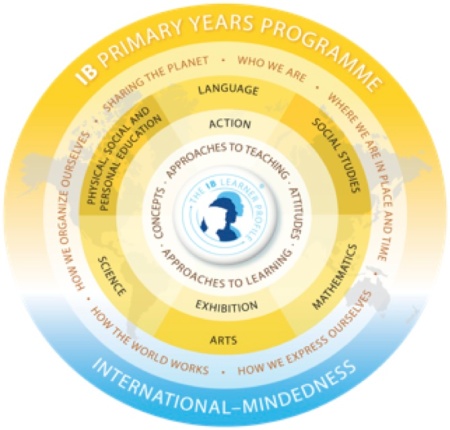The IB Primary Years Programme
The International Baccalaureate Primary Years Programme (PYP) is an international curriculum leading into the IB Middle Years and Diploma Programmes, which are also offered at IST. The Elementary School is fully authorized by the International Baccalaureate Organization. The PYP stresses the importance of determining the existing knowledge that students bring to new experiences, as it is critical to allow children the opportunity to make connections between their previous and current perceptions. The PYP offers a curriculum, which is:
Internationally minded:
Children share and explore ideas collaboratively. The ability to consider the point of view of someone else in the same class plays a central role in developing an international perspective. As well as English, students are required to learn a modern language (Kiswahili, Spanish or French). One of the goals of exposing children to languages other than their mother tongue is to provide an insight into and an appreciation of other cultures.
In addition, this sensitivity is enhanced, as students are encouraged to develop the attributes of the learner profile. We aim to develop internationally minded students who are:
- Thinkers
- Inquirers
- Knowledgeable
- Communicators
- Risk-takers
- Principled
- Caring
- Open-minded
- Balanced
- Reflective
Transdisciplinary:
The subject areas of mathematics, language, science, drama, technology and social studies are organized under six transdisciplinary themes. These global themes help teachers and children explore knowledge and make meaningful learning connections between the subjects through units of inquiry. Where possible, units of inquiry are supported by the arts, physical education and modern languages.
The six transdisciplinary themes are:
- Who we are
- Where we are in time and place
- How we express ourselves
- How the world works
- How we organize ourselves
- Sharing the planet
Concept driven:
At the center of the curriculum are key concepts or big ideas that have relevance within and across subject areas. These big ideas are explored through questions, which are used to structure theunits of inquiry.
Form……………………………..…………… what is it like?
Function………………………..…….…. how does it work?
Causation………………………………… why is it like it is?
Change…………………..………………how is it changing?
Connection ……………how is it connected to other things?
Perspective………..………..what are the points of view?
Responsibility…..……..……..what is our responsibility?
Reflection……….…………………………how do we know?
Inquiry based:
The PYP is committed to structured inquiry as a vehicle for learning, building upon prior knowledge and experience and emphasizing how to learn and how to find out the things we want to know. Children’s natural curiosity about their world is nurtured through the inquiry process. At IST, children are involved in their learning and are guided through the processes of questioning, investigating, reflecting, sharing and taking action.
Skills orientated:
The students acquire and apply transdisciplinary skills.
They are organized under the following headings.
- Thinking skills
- Communication skills
- Social skills
- Research skills
- Self-management skills
Enhanced by positive attitudes:
The development of explicit attitudes and the expectation of socially responsible behavior are also essential elements of the program.
Consequently, IST emphasizes:
- Appreciation
- Commitment
- Confidence
- Cooperation
- Creativity
- Curiosity
- Empathy
- Enthusiasm
- Independence
- Integrity
- Respect
- Tolerance
Meaningful and leads to student led action:
Students are encouraged to reflect on their learning and act on that which they consider to be meaningful to them. This can lead to service within the school community, the local community or even the global community. The essential elements of the primary years programme are synthesized through the stages of the planning and teaching process. Teachers and students work together to generate questions and plan engaging activities, which enable questions to be answered, skills to be developed and understanding to occur. Assessment of student progress is ongoing, using a range of strategies and assessment tools.






